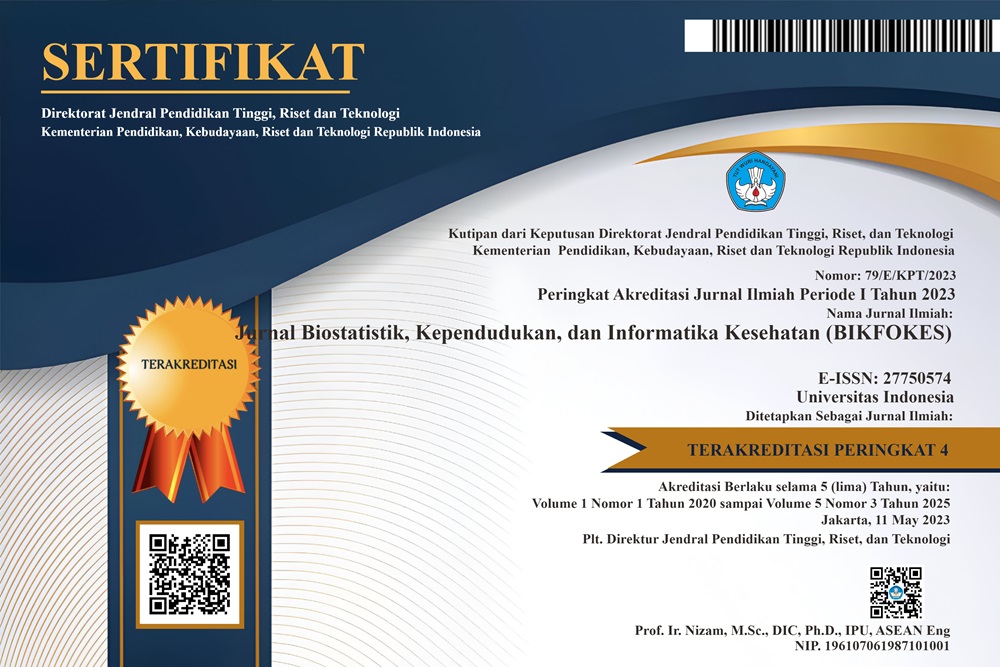Abstract
Tuberculosis still becomes a health problem both in the world and in Indonesia. Central Java is The third highest province of tuberculosis in Indonesia. Spatial analysis is an essential tool for evaluating the tuberculosis distribution pattern according to geographic location. This research aims to determine tuberculosis hotspot areas and discover whether there is a spatial correlation between districts/cities in Central Java based on tuberculosis cases using the spatial autocorrelation method through the Moran Index and Local Indicators of Spatial Associations (LISA). Secondary data in the form of the aggregate number of all tuberculosis cases in 2022 was collected from the Indonesian Central Statistics Agency published in Central Java in Figures 2023. Analysis was carried out using ArcViw Gis 3.3 and GeoDa software and the unit of analysis of the study is districts/cities. The results of the research show that there is negative spatial autocorrelation with no spatial autocorrelation. This result means tuberculosis cases in one adjacent district/city in Central Java Province have different values and tend to spread. The area that will become a tuberculosis hotspot in Central Java in 2022 is Tegal Regency. The health intervention is suggested to be performed in tuberculosis hotspot areas to reduce tuberculosis cases in Central Java
References
1. Mar’iyah K, Zulkarnain. Patofisiologi penyakit infeksi tuberkulosis. In: Prosiding Biologi Achieving The Sustainable Development Goals With Biodiversity In Confronting Climate Change. Makassar: UIN Alaluddin Makassar; 2021. p. 88–92.
2. WHO. Global Tuberculosis Report 2022. Geneva: WHO; 2022.
3. Kementrian Kesehatan RI. Laporan Program Penanggulangan Tuberkulosis Tahun 2021. Jakarta: Kementrian Kesehatan RI; 2022.
4. Badan Pusat Statistik. Provinsi Jawa Tengah Dalam Angka 2023. Semarang: Badan Pusat Statistik; 2023.
5. Kementerian Kesehatan RI. Hasil Utama Riskesdas 2018. Kementrian Kesehatan RI. Jakarta; 2018.
6. Kementrian Kesehatan RI. Laporan Program Penanggulangan Tuberkulosis Tahun 2022. Jakarta: Kementrian Kesehatan RI; 2023.
7. Mathema B, Andrews JR, Cohen T, Borgdorff MW, Behr M, Glynn JR, et al. Drivers of Tuberculosis Transmission. J Infect Dis. 2017;216(suppl_6):S644–53.
8. Theron G, Jenkins HE, Cobelens F, Abubakar I, Khan AJ, Cohen T, et al. Data for action: collection and use of local data to end tuberculosis. The Lancet. 2015;386(10010):2324–33.
9. Wardani DWSR. Pemanfaatan Statistik Spasial dalam Mempelajari Faktor Risiko Tuberkulosis Paru sebagai Upaya Penurunan Insidensi Tuberkulosis Paru. Jurnal Kedokteran Universitas Lampung. 2016;1(2):358–62.
10. Sifuna PM, Ouma C, Atieli H, Owuoth J, Onyango D, Andagalu B, et al. Spatial epidemiology of tuberculosis in the high-burden counties of Kisumu and Siaya, Western Kenya, 2012–2015. The International Journal of Tuberculosis and Lung Disease. 2019;23(3):363–70.
11. Syukri M, Nasution HS. Identifikasi Pola Sebaran Spasial Dengan Metode Getis Ord Gi* Pada Kasus Tuberkulosis Di Kota Jambi 2018-2021. Jurnal Ilmiah Permas: jurnal Ilmiah STIKES Kendal. 2022;12(4):621–8.
12. Lima SVMA, dos Santos AD, Duque AM, de Oliveira Goes MA, da Silva Peixoto MV, da Conceição Araújo D, et al. Spatial and temporal analysis of tuberculosis in an area of social inequality in Northeast Brazil. BMC Public Health. 2019;19(1):873.
13. Im C, Kim Y. Spatial pattern of tuberculosis (TB) and related socio-environmental factors in South Korea, 2008-2016. PLoS One. 2021;16(8):e0255727.
14. Riznawati A, Yudhistira D, Rahmaniati M, Sipahutar T, Eryando T. Autokorelasi Spasial Prevalensi Stunting di Jawa Barat Tahun 2021. Jurnal Biostatistik, Kependudukan, dan Informatika Kesehatan. 2023;3(1):14.
15. Zebua HI. Spatial Autoagressive Quantile Regression Pada Kasus Tuberkulosis di Kota Bandung. ournal Of Analytical Research, Statistics and Computation. 2023;2(2).
16. Lestari W, Brata AS, Anhar A, Rahmawati S. Analisis Autokorelasi Spasial Global dan Lokal Pada Data Kemiskinan Provinsi Bali. Jambura Journal of Mathematics. 2023;5(1):218–29.
17. Mailanda R, Kusnandar D, Huda NM. Analisis Autokorelasi Spasial Kasus Positif Covid-19 Menggunakan Indeks Moran dan LISA. Bimaster : Buletin Ilmiah Matematika, Statistika dan Terapannya. 2022;11(3):483–92.
18. Alene KA, Xu Z, Bai L, Yi H, Tan Y, Gray DJ, et al. Spatiotemporal Patterns of Tuberculosis in Hunan Province, China. Int J Environ Res Public Health. 2021;18(13):6778.
19. Rodrigues NCP, Andrade MK de N, O’Dwyer G, Flynn M, Braga JU, Almeida AS de, et al. Distribution of pulmonary tuberculosis in Rio de Janeiro (Brazil): a spatial analysis. Cien Saude Colet. 2017;22(12):4125–34.
20. Chen X, Emam M, Zhang L, Rifhat R, Zhang L, Zheng Y. Analysis of spatial characteristics and geographic weighted regression of tuberculosis prevalence in Kashgar, China. Prev Med Rep. 2023;35:102362.
21. Xue M, Zhong J, Gao M, Pan R, Mo Y, Hu Y, et al. Analysis of spatial-temporal dynamic distribution and related factors of tuberculosis in China from 2008 to 2018. Sci Rep. 2023;13(1):4974.
22. Khoirunissa HA. Pemetaan Risiko Penyakit Tuberkulosis (TBC) di Kota Surakarta dengan Spatial Empirical Bayes. Indonesian Journal of Applied Statistics. 2021;3(2):78.
23. Yang DL, Li W, Pan MH, Su HX, Li YN, Tang MY, et al. Spatial analysis and influencing factors of pulmonary tuberculosis among students in Nanning, during 2012-2018. PLoS One. 2022 May 1;17(5):e0268472.
24. Chirenda J, Gwitira I, Warren RM, Sampson SL, Murwira A, Masimirembwa C, et al. Spatial distribution of Mycobacterium Tuberculosis in metropolitan Harare, Zimbabwe. PLoS One. 2020;15(4):e0231637.
Recommended Citation
Saini, Izzatul Mardiah and Eryando, Tris
(2024)
"Spatial Autocorrelation of Tuberculosis Cases in Central Java Province in 2022,"
Jurnal Biostatistik, Kependudukan, dan Informatika Kesehatan: Vol. 4:
No.
3, Article 1.
DOI: 10.7454/bikfokes.v4i3.1079
Available at:
https://scholarhub.ui.ac.id/bikfokes/vol4/iss3/1


